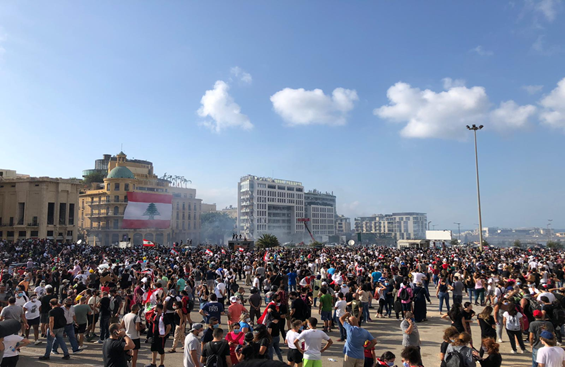
By Sarah Tayara/ GICJ
October 17th 2019- the day where massive protests shook Lebanon from its decades of paralysis. The day where civilians flooded the streets of Lebanon demanding an end to the corruption which has engulfed the Lebanese public sector. One year on since more than a million Lebanese citizens united to storm down the streets of the country chanting “Revolution!” and “Kellon Yaani Kellon,” translating to “All of Them Means All of Them'' (with respect to the corrupt politicians). One year has passed since the Lebanese rose up against politicians who have been thriving off sectarian politics and nepotism, enjoying the luxuries it brings them at the expense of their people. The stark reality is, however, that on year on and the Lebanese have been plunged further into destitution, poverty and hardship than they ever could have expected.
When the people of Lebanon united, demanding fundamental political change and justice, little did they know that every issue they were protesting against would have multiplied, throwing them deeper into a pit of despair. Despite their constant pleas, the corrupt ruling elite which crippled their country, pushing it to the brink of collapse remains unscathed. Lebanon’s movement from its socioeconomic, political, and frankly humanitarian point of paralysis does not bear the fruit of freedom and prosperity. Rather, it signifies the country’s regression into deeper turmoil than its citizens could have expected.
When all of this is deconstructed, the situation becomes even more pessimistic. Behind the abstract concept of the revolution there stands the hopeful Lebanese citizen who has had their rights ripped away, one after the other, by a government which promotes its own interests. There stands a citizen who dreamt of a brighter future but has been submerged into darkness.
A Looming Darkness: The Crumbling Lebanese State.
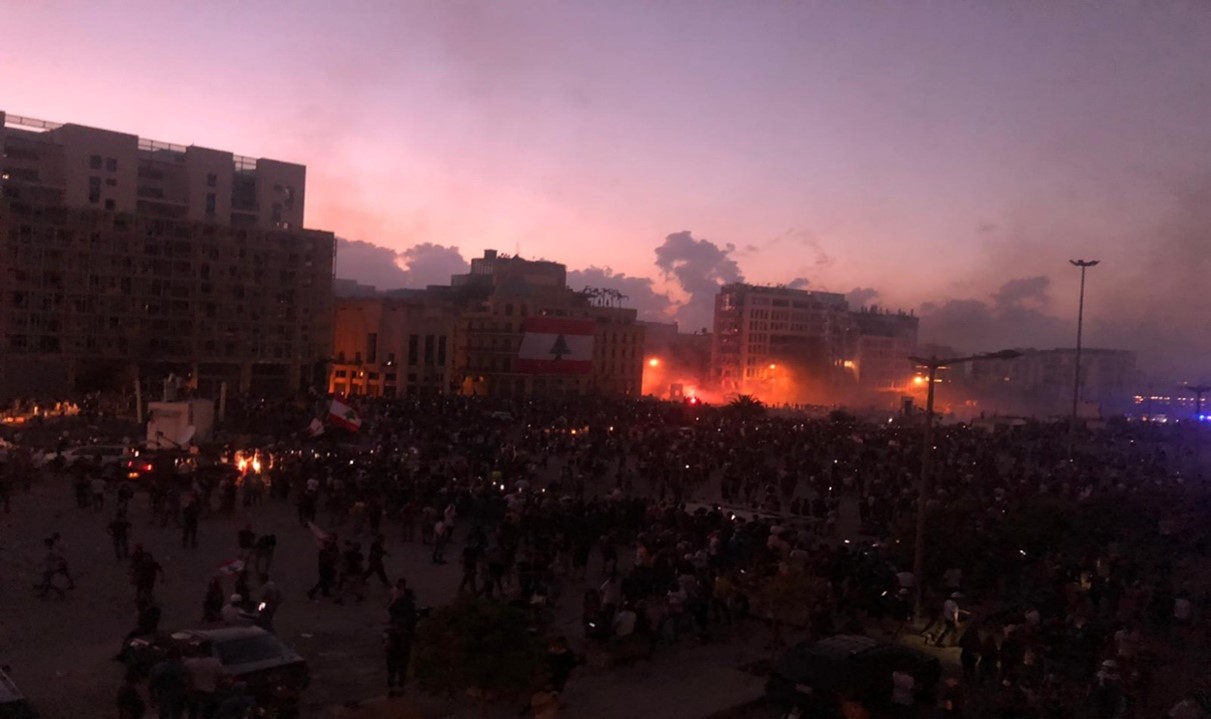
The October Revolution was initially triggered by a planned tax on WhatsApp. It is clear, however, that this decision represented so much more than a tax. It encapsulated the entire dynamic between the Lebanese citizen and politician. The unjust dynamic in which the Lebanese were forced to live in their own country which was crumbling amongst the soaring employment rates of over 40%, the stagnant economy and the legislation which was so opaque to the needs of its citizens, yet so transparent in its protection of the ruling class from any form of accountability.
The government response to the calls for fundamental political change and justice, however, further highlighted its immense failure and the fundamental reasons that the Lebanese had united. The disfunction, mismanagement and complete negligence of the Lebanese state following the protests was only representative of the fundamental reason its people had risen against it. As the protestors chanted for an end to corruption and a rise in accountability, the Lebanese state security forces unleased excessive force on the people to supress their voices. When this did not deter them, tear-gas was callously unleashed on the crowds in an attempt to silence them.
But how could the state use tear gas suppress people who had run out of tears?
How could they use tears to clampdown on people who had already cried over the loss of loved ones due to a crumbling healthcare system? People who had lost family because of the government’s incompetency to adequately supply hospitals and doctors with the necessary supplies and resources. People who had lost friends because Lebanon’s failing economy and dollar shortage meant that hospitals could not afford to import medication and other basic supplies in light of the COVID-19 pandemic.
How could they use tear gas on people who had already cried in humiliation over their living situation? People who cry at night due to their inability to provide for their families. People who have to live amongst inflation of 200%, meaning they cannot afford to buy food for their children.
How could they use tear gas on people who had already shed tears of frustration over the lack of electricity? People who had been plunged into both physical and metaphorical darkness because of the country’s fuel shortage which means that 22-hour black outs are a normality in Lebanese life. People who had to endure the plummeting living standards which directly resulted from the government’s inability to crack down on the ‘generator mafias’ which filled the country, profiting off the backs of the mother and father needing electricity to heat their child’s milk before they sleep.
How could they use tear gas on a population which had already run out of tears as it cried from fatigue? People who had worked for hours on end but had received so little that they could not afford to put dinner on the table.
How could they use tear gas on people whose eyes had already watered from the chemicals and toxins from the 2015 garbage crisis? People who had walked through mountains of trash and swam in beaches where sewage was pumped into sea, compromising the health of the residents and the environment.
And so, the Lebanese government’s resort to force as its primary mechanism of response only highlighted the very reasons that its people were revolting. The governments incompetency and negligence were the direct cause of Lebanese destitution.
The Lebanese Vision
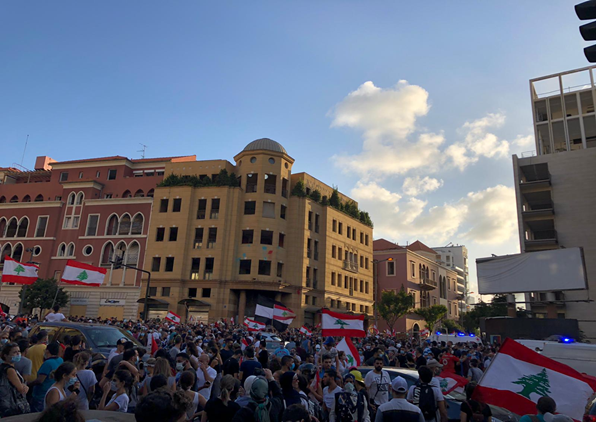
The October demonstrations had a clear goal- a call for fundamental change and justice. At the very basis of these demands was the dismantling of Lebanon’s sectarian political system of government, founded in the Taif Agreement in 1989. The system which has enshrined a sect-based political system which allocates political responsibility on the basis of religion rather than merit. The Lebanese have instead developed a different vision for Lebanon. A Lebanon for the people. The October revolution held no flag but the Lebanese Flag. The Lebanese yearn for a country in which politicians cannot exploit their positions of power and evade any notion of accountability. In short, the October revolution was a Lebanon’s plea to have their country belong to them instead of the civil war-era warlords who undermine the notion of democracy and freedom.
The overwhelming unity of the Lebanese in the demonstrations have been prominent. This emphasises their desperation to end the perpetual instability that has submerged them since the establishment of the destructive Iran-Hezbollah influence after the 2005 Rafik Hariri assassination and the 2006 July War. Iran’s financial, political and military support for the Hezbollah militia is menacing. Its overarching power in the country and its unmanaged possession of arms has directly led to instability which has frenzied the Lebanese population. Known as the ‘State within the State’, Hezbollah has been gifted with a veil of invincibility which has debilitated the country. The Lebanese call for a Lebanon free from Iranian dominance and the suffocating control of the Hezbollah militia which controls the country’s politics, economy and foreign affairs without any system of accountability.
Such demands are hardly new. They are strikingly similar to the Iraqi demands for the end of Iranian support for the corrupt and dangerous Dawa party and Hashd al-Shaabi militant group in their own October Revolution call. Their highly segmented societies and sectarian politics which have resulted in power-sharing constitutions and political pacts supposedly aimed at maintaining peace but resulting in corruption and instability. The Lebanese system of allocating a Maronite president, a Sunni prime minister, and a Shiite speaker of parliament has resulted in a dysfunctional government which fails to provide electricity, responsibly manage state budgets, and provide employment to its youth. Both the Lebanese and Iraqis ache from the same pain. As the Lebanese protestors marched through Martyr Square, they held up the Iraqi flag, returning a salute to Baghdad which also rose against Iran’s arms. Hand in hand, the people cried out against sectarianism and Iranian terrorism. Hand in hand, they cried out for a civil state.
The people’s demand cannot be clearer. It is time to dismantle these elitist systems and create a nation for the people. A nation that has no flag but the Lebanese flag. A nation in which the leaders rule because of merit and not because of connections. It is paramount that the Lebanese are granted what they are fundamentally entitled to before Iran and Hezbollah crush them into submission.
Moreover, with the rise of the COVID-19 pandemic, the pre-existing issues in Lebanon became exacerbated. A plummeting lira, soaring inflation and rising unemployment all combined with the government’s seeming indifference meant that COVID-19 was only one more factor which added to the Lebanese hardship. Their persistence in the face of adversity only highlights their sheer desperation. Their commitment to maintaining the momentum of their cause through the pandemic should not constitute a point of blame. Instead, this emphasises that their social, economic and political rights continue to be violated and undermined throughout this turbulent time.
In response to COVID-19, Lebanese state capitalised on the pandemic by using it as a reason to send people home and suppress their right to speak out about state corruption.
Beirut Blast: The Detonation Of The Ticking Time Bomb
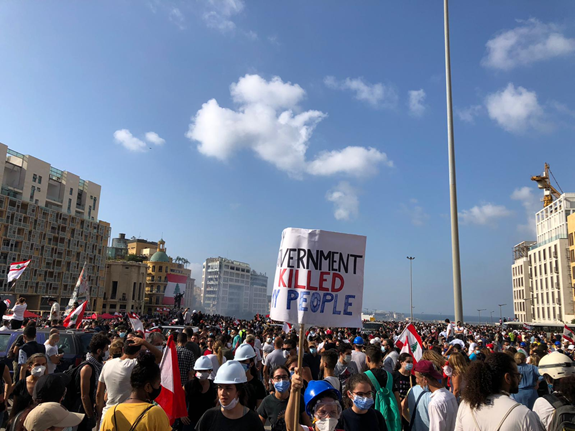
Almost a year after the beginning of the October Revolution, the government’s ineptitude to protect its people manifested once again. 4 August 2020 is a day that has been ingrained into Lebanese history. A day in which the astounding ineptitude of Lebanese officials devastated the city of Beirut with the largest non-nuclear blast in history. Its cause? It was not inevitable. It was not bound to happen. It could have been avoided. Lives could have been saved. Yet the corruption and negligence of the Lebanese government once again led to the anguish of their population and the violation of their fundamental rights.
The cause of the Beirut Blast is yet to be investigated. What is unquestionable however, is that it was a direct consequence of the negligence and corruption of the Lebanese officials who had been warned of the improper storage of a massive stockpile of explosive chemicals in the heart of Beirut. Yet, nothing was done. For six years, the Lebanese government sat back with the knowledge that the heart of its city is beating with deadly chemicals. For six years it continued with its daily procedures, knowing that the threat of 2,750 tonnes of ammonium nitrate loomed over its people, despite its officials being warned.
Some say the detonation was an accident, others say it was targeted, the rest say it was sabotage. Whatever the cause, the reality remains clearer than ever. The mere storage of such deadly explosives amidst the country’s civilisation in itself is a crime that the leaders should be held accountable for. One by one. Politician by politician. Kellon Yaani Kellon.
While the President, Michel Aoun, said he had nothing to do with it, thousands of people mourned the loss of their loved ones. As the Prime Minister at the time, Hassan Diab, claimed he was innocent in the knowledge of such explosives, Lebanon grieved the death of more than 200 people and 6000 wounded civilians. As Hassan Nasrallah, the leader of the influential Hezbollah militia and what many refer to as the “State within a State”, claimed with utter callousness that his weapons were not stored at the port, contrary to many other analysts’ predictions, thousands of civilians rummaged through the streets of Beirut to search for their loved ones amongst the rubble that engulfed them.
It is precisely these lies and lack of accountability that led Lebanon to its knees.
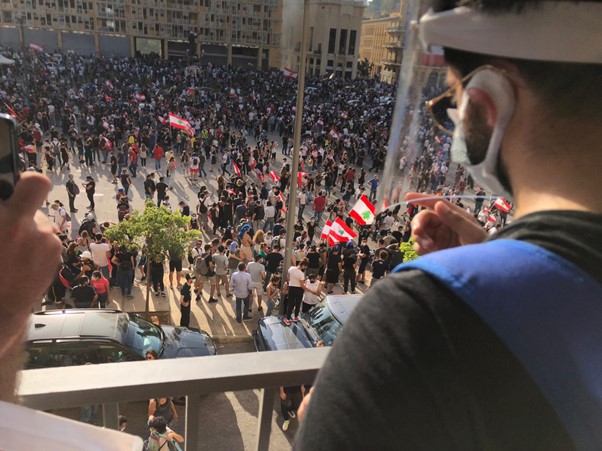
The Beirut Blast encapsulated the dire effect that the sheer negligence and incompetency of the Lebanese state had on the innocent civilian. Following the explosions, protestors stormed the streets once again. This time, however, the protests which were once filled with cheerful songs and laughter turned into a vehement demand for accountability and resignation of all Lebanese government officials. The Lebanese government’s reflex response was once again to resort to violent tactics which violate international humanitarian law. Lebanese security forces used excessive and at time lethal force against protestors who came out with a bleeding heart for the loss of their loved ones. Live ammunition, metal pellets, and kinetic impact projectiles such as rubber balls, were fired at protestors, including at health workers. Police deployed excessive quantities of tear gas, including at first aid stations. Security forces also threw stones at protesters and beat them. Instead of lending a helping hand to their people who were still digging themselves out of the debris, Lebanon’s security forces made a fist and pummelled the protesters.
Political Overhaul: Nothing But Superficial Change
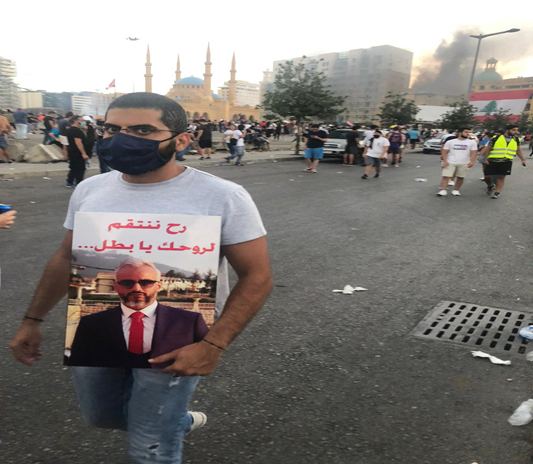
The resignation of the Lebanese government following the Beirut Blast was only one small step in the right direction. But it is not enough. Since then, it has been clear that the rights of the Lebanese are hardly on the agenda of Lebanese officials. It has been clear, however, that the Lebanese state is not interested in the fundamental change that its people demands. Michel Aoun’s approach to the entire situation has been uninterested and indifferent. At a time which calls for strong leadership and unity, he has provided only one concrete solution to his people- telling them to emigrate if they were not happy with the situation in Lebanon.
The resignation of Hassan Diab was merely a temporary plaster placed onto a gushing wound. The inability to get Lebanon’s fractious leaders to agree on a new government and give up their sectarian powers for a political reform was evident in the stepping down of Mustapha Adib, the designated Prime Minister following the Blast. Lebanon’s largest Shia parties, specifically the Amal movement and Hezbollah, still have the upper hand in politics and the economy in Lebanon, due to their influence in many key sectors including security and finance, and the lack of an equally strong Sunni bloc. Their critics say that, despite the economic downfall of the country and a nearly bankrupt state, both Shia movements still care more about protecting their own interests.
Amidst all this chaos, Lebanese civilians suffer the consequences. The prospect of stability continues to get further away as the country’s healthcare, economic and educational infrastructures continue to bear the brunt of the political turmoil.
One year on from the start of the Lebanese dream, there has been nothing but superficial attempts to grant the citizens of Lebanon what they rightfully are entitled to. Consistent human rights violations continue to be overlooked and the country lacks any system of accountability to provide justice for the victims of the Lebanese state. This past year of revolt should not be yet another point in Lebanese history which will be moved on from. It should be a turning point. A point for reform and responsibility not only for this, but for all the hardships unleashed on Lebanon. For its role in all the deaths of not only the bodies, but also the hearts of its victims.
The accountability must start now. One by one. Kellon Yaani Kellon.
Photos credit: SarahbTayara/GICJ
______________________________________________________________________________________________________________________________________________________________________________________________________________________________________________________________________
Justice, Human rights, Geneva, geneva4justice, GICJ, Geneva International Centre For Justice







